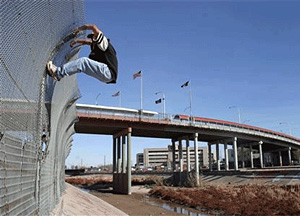 |
 |
 |
 Editorials | Environmental | January 2007 Editorials | Environmental | January 2007  
Environmental Rules Waived to Make Way for U.S.-Mexico Fence
 Arthur H. Rotstein - Associated Press Arthur H. Rotstein - Associated Press


| | A migrant tries to cross into the U.S. from the Mexican border town of Ciudad Juarez, under the bridge that connects the border city with El Paso March 6, 2006. U.S. House Representatives voted in December to build a similar barrier to stop illegal immigrants across one-third of the 2,000-mile U.S.-Mexico border, seen as a weak spot in homeland security since the Sept. 11 attacks. (Reuters/Stringer) |
Homeland Security Secretary Michael Chertoff waived environmental rules to clear the way for a border fence to be constructed along the Mexican border.

Friday's move circumvented a series of laws, from the Endangered Species Act to the Federal Water Pollution Control Act and the National Environmental Policy Act, outraging environmentalists.

Robin Silver, board chair of the environmental organization Center for Biological Diversity, called Chertoff's move "a historic travesty."

"Because they refuse to deal head-on with the economics of the immigration challenge, they're now taking a step to destroy the integrity of the central part of southern Arizona's desert," Silver said. "There's not a wall on earth that's going to stop a human in search of a minimum-wage job to feed his hungry family."

It was unclear when construction on 37 miles of traditional and virtual fencing would begin at the Air Force's training range in southwestern Arizona. The project also includes radar and other infrastructure, lighting, all-weather and drag roads, expected to cost in the neighborhood of $64 million.

Chertoff voided "environmental requirements and other legalities that have impeded the department's ability to construct fencing and deploy detection technology on the range," spokesman Russell Knocke said in Washington.

Knocke said small openings will be made in fencing to allow the flat-tailed horned lizard to continue crossing into Mexico. | 
 | |
 |



